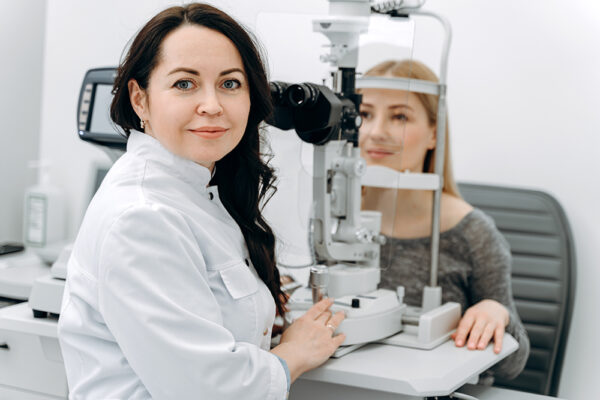Wondering if you’re a good candidate for LASIK?
Millions of people have LASIK every year… and many call it one of the best decisions of their lives.
But did you know that there may be even better options for your eyes? — such as Evo ICL, PRK, or Custom Lens Replacement (CLeaR)?
With so many options nowadays, almost everyone is a candidate for at least one of these procedures.
In this article, we’re going to discuss the key factors to help you determine which modern vision correction procedure might be best for you – LASIK, Evo ICL, PRK, or CLeaR.
The key factors include:
- Age
- Vision Stability
- Prescription
- Cornea Factors
- General Eye Health
- Pregnancy
Let’s get started!

Age
Age is an important factor when considering a vision correction procedure. Typically, the youngest age most surgeons will consider for surgery is 18.
Even if you are 18, if your prescription continues to change every year, your doctor will recommend waiting until it stabilizes so that you get a longer-lasting result.
By the age of 18, many patients have stable prescriptions making them good candidates.
Based on your age, your doctor may recommend different procedures. Laser vision correction (e.g. LASIK) and Evo ICL are typically best for younger patients, aged 18-45.
For patients older than 45, Custom Lens Replacement (CLeaR) is often the better option. However, there is no upper limit on how old a patient can be to have LASIK. Many patients in their 70’s and 80’s have it every year.
General guidelines:
- Age 18-21: Laser Vision Correction
- Age 21-45: Laser Vision Correction or Evo ICL
- Age 45+: Laser Vision Correction, Evo ICL, or Custom Lens Replacement (CLeaR)
There are exceptions to every rule. However, this is how age will factor in for most people.
Vision Stability
For patients considering laser vision correction or Evo ICL, the stability of your vision prescription is crucial. Your glasses of contact lens prescription should have remained stable for at least 1 year before considering one of these procedures.
For patients older than 40, stability is often not as important. There are age-related changes that occur in the natural lens after the age of 40. This is a normal part of aging. Because the natural lens is removed, patients will no longer need to worry about these age-related changes.
In rare cases, patients over the age of 40 may have prescription changes related to other eye conditions, such as keratoconus. However, this is very uncommon, and should be noticed by your doctor during the evaluation process.
Prescription
Whether you are nearsighted or farsighted may impact which procedure you’re a candidate for. Astigmatism is another part of your prescription which is also a factor. We’ll discuss that in a separate section below. Let’s discuss nearsightedness and farsightedness first.
Nearsighted
Nearsighted patients may be good candidates for several vision correction procedures. If you are nearsighted, which procedure is best for you may depend on several factors, such as how nearsighted you are, the size and shape of your cornea, and the other factors in this article.
For example, in all laser vision correction procedures, the cornea is made thinner. It is important that adequate thickness of the cornea is left behind after the procedure. Your surgeon will calculate this amount during the planning of your procedure.
Laser vision procedures that can treat nearsightedness include LASIK, PRK, and SMILE.
A patient with a low nearsighted prescription (e.g. -3.50) will have much less thinning of the cornea compared to a patient who is very nearsighted (e.g. -10.00). For a patient with a -10.00 prescription to be a candidate for LASIK, they must have a relatively thick cornea. Where a patient with a lower prescription may be an excellent candidate for laser vision correction even if they have a cornea with below average thickness.
Evo ICL is available for patients who are more nearsighted than -3.00. The Evo ICL comes in prescriptions up to -16.00 diopters.
For some patients with extreme prescriptions, they may require multiple procedures. For example, a patient with a -20.00 prescription may have a great outcome with an Evo ICL, but still require LASIK to finish the job.
Farsighted
Farsighted prescriptions can be treated with LASIK and PRK. SMILE is not approved for farsighted prescriptions currently. Evo ICL is also not approved for farsighted prescription in the United States.
There are limits to how much farsightedness can be treated with LASIK or PRK.
For higher levels of farsightedness, Custom Lens Replacement (CLeaR) may be the best option. This is especially true if the patient is over the age of 45. Patients younger than 45 may also be candidates for CLeaR.
Astigmatism
Astigmatism is part of your glasses prescription and has been correctable with various procedures, including LASIK for decades.
In fact, almost everyone has at least a little bit of astigmatism.
LASIK, PRK, SMILE, Evo ICL, and Custom Lens Replacement all can fix astigmatism.
Which procedure you’re a candidate for will depend on other factors like your overall prescription, corneal size & shape, and other factors.
Cornea Factors
There are several characteristics of your cornea that your doctor will look at to determine which procedure(s) you’re a candidate for. Assessing these factors requires advanced diagnostic equipment in a specialists office, in addition to an eye exam.
Cornea Thickness
The health and thickness of your cornea play a vital role in determining candidacy for certain refractive surgeries. LASIK and PRK involve reshaping the cornea, so an adequate corneal thickness is necessary for safe and effective results. Your eye care professional will evaluate the thickness of your cornea during the initial consultation.
Corneas that are too thin relative to the amount of laser treatment required may not be good candidates for LASIK, PRK or SMILE. Evo ICL or CLeaR may be better options for these patients.
Cornea Shape
Corneas with irregular shapes may be related to a condition called keratoconus. Irregular corneas may also be a risk factor for instability or “ectasia” following laser vision correction that thin the cornea.
Since Evo ICL and Custom Lens Replacement do not involve laser treatment or thinning of the cornea, they may be the best treatment for patients with irregular corneas.
Cornea Health
Corneal scars or other diseases of the cornea may make some patients poor candidates for certain procedures.
One of the most common reasons for corneal scars is infections from contact lenses. Poor contact lens practices can lead to infections. These patients may be excellent candidates for certain procedures which will get them out of contacts to avoid the risk of future infections. If a scar is thick enough, LASIK and SMILE may not be a good options. However, PRK, EVO ICL, and CLeaR may still be considered.
General Eye Health
Your overall eye health is essential when considering refractive surgery. Conditions such as cataracts, glaucoma, severe dry eye syndrome, or other eye diseases might impact your eligibility for specific procedures. A comprehensive eye examination will help identify any pre-existing conditions that could affect the success and safety of the surgery.

For example, if you have a cataract, you would not be considered a good LASIK candidate. The better option would be to have cataract surgery with a custom lens implant to correct your vision.
Other conditions such as infections, autoimmune diseases, and retinal conditions are important to discuss with your doctor.
Pregnancy
If you are currently pregnant, it is advisable to postpone refractive surgery. Hormonal changes during pregnancy can affect the stability of your vision, making it difficult to determine accurate treatment plans. It is best to wait until after these hormonal changes have stabilized before considering any refractive surgery.
Summary
Determining whether you are a candidate for refractive surgery involves many factors. Most optometry practices don’t have the necessary equipment to consider all of these factors.
Consulting with an experienced Refractive Surgeon is crucial to evaluate your individual case and recommend the most appropriate procedure. By thoroughly understanding your eligibility, you can make an informed decision about whether refractive surgery is the right path for you. Remember, your eye health and safety should always be the top priority.
